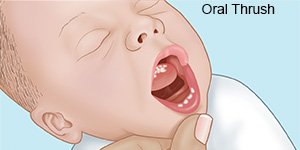Infant Thrush
Medically reviewed by Drugs.com. Last updated on Aug 4, 2025.
What is infant thrush?
Infant thrush is a yeast infection of your infant's mouth. The same yeast may also cause a diaper rash. This yeast is a type of fungus called Candida. This yeast is normally present in your infant's mouth and digestive tract. Sometimes the yeast can overgrow and cause a yeast infection. Medicines such as antibiotics or steroids may increase your infant's risk of thrush.
 |
What are the signs and symptoms of infant thrush?
- White patches on your infant's lips, tongue, or the inside of his or her cheeks that do not wipe off easily
- Cracked skin on the corners of your infant's mouth
- Mouth pain or soreness, which may cause decreased milk intake
- A severe diaper rash at the same time
How is infant thrush diagnosed?
Your infant's healthcare provider will examine the patches or rash. The provider may scrape the inside of your infant's mouth to take a sample of the white patches. The provider will look at the sample through a microscope.
How is infant thrush treated?
Your infant may need to take antifungal liquid medicine. This medicine will need to be applied to the areas of your infant's mouth that have thrush. You may also need to apply an antifungal cream to your infant's diaper area if he or she has a diaper rash.
How can I manage infant thrush?
- Limit your infant's pacifier use if you think he or she has mouth pain. Sucking for long periods of time can irritate your infant's mouth. Try to use the pacifier only when you cannot find another way to calm your infant.
- Feed your infant with a cup, spoon, or syringe instead of a bottle if you think he or she has severe mouth pain. Your child may not want to take the bottle if he or she has pain.
- Wash the nipples from your infant's bottles and pacifiers in hot water or dishwasher after each use.
- Apply antifungal cream to your nipples if you breastfeed and your nipples are red and sore. You may have also have a yeast infection on your nipples. Apply the cream to your nipples 4 times each day after you breastfeed your infant, or as directed.
When should I seek immediate care?
Your infant has signs of dehydration including any of the following:
- Crying without tears
- Urinating less than usual or not at all
- Dry mouth
When should I contact my infant's doctor?
- Your infant is drinking or eating less than usual.
- Your infant has a fever.
- There is bleeding in the areas where your infant has thrush.
- You have questions or concerns about your condition or care.
Care Agreement
You have the right to help plan your baby's care. Learn about your baby's health condition and how it may be treated. Discuss treatment options with your baby's healthcare providers to decide what care you want for your baby. The above information is an educational aid only. It is not intended as medical advice for individual conditions or treatments. Talk to your doctor, nurse or pharmacist before following any medical regimen to see if it is safe and effective for you.© Copyright Merative 2025 Information is for End User's use only and may not be sold, redistributed or otherwise used for commercial purposes.
Learn more about Infant Thrush
Treatment options
Care guides
Further information
Always consult your healthcare provider to ensure the information displayed on this page applies to your personal circumstances.
